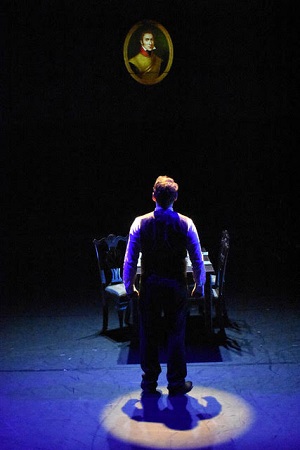 United States 2019 New York Opera Fest [3] – Britten, Owen Wingrave: Soloists, Orchestra / Richard Cordova (conductor), the little OPERA theatre of ny, GK Arts Center, Brooklyn, 11.5.2019. (RP)
United States 2019 New York Opera Fest [3] – Britten, Owen Wingrave: Soloists, Orchestra / Richard Cordova (conductor), the little OPERA theatre of ny, GK Arts Center, Brooklyn, 11.5.2019. (RP)

Production:
Director – Philip Shneidman
Sets & Lighting – Josh Smith
Costumes – Lara de Bruijn
Projections – Alex Basco Koch
Stage Manager – Alex Kesner
Cast:
Owen – Robert Balonek
Coyle – Matthew Curran
Lechmere – Bernard Holcomb
Miss Wingrave – Emily Pulley
Mrs. Coyle – Janice Hall
Mrs. Julian – Mary Ann Stewart
Kate – Katherine Pracht
General Sir Philip Wingrave/Narrator – Rufus Müller
Ballad Singer – Kannan Vasudevan
New York waited almost 50 years for a staged production of Britten’s Owen Wingrave. Commissioned by the BBC, the opera premiered on television in 1971 and was subsequently seen at Covent Garden in 1973 and at Santa Fe the following year. At heart a ghost story, it is also an expression of Britten’s pacifist sensibilities: a powerful polemic against the military establishment composed when the Vietnam War was raging. Owen Wingrave is one of Britten’s most challenging operas, both musically and dramatically, but the little OPERA theatre of ny proved it can be a gripping theatrical experience.
Myfanwy Piper crafted the opera’s libretto from Henry James’s novel of the same name. The Wingrave men go to war when they are called; Sir Philip, Owen’s grandfather, lives for war and his father died in battle. Owen is the last of the line, the most gifted and heroic of them all in the eyes of Coyle, his tutor in the arts of war. He, however, rebels, thus upending the very foundation on which the family’s station and pride rests.
After a scathing tongue lashing from his aunt, the formidable Miss Wingrave, Owen is sent to the family estate, Paramore, in which hang the portraits of the deceased male members of the Wingrave line. One of a father and son haunts the young man. Family lore has it that when the son refused to fight another boy, his father took him into an upstairs room where he killed him with a single blow. The father was later found dead in the room without a wound. The same fate awaits Owen.
Baritone Robert Balonek, as Owen, had the ramrod straight posture of a soldier and was unflinching in the face of the verbal abuse hurled at him. His baritone has the same rock-solid qualities. Crucially, Balonek also captured Owen’s innate innocence, a trait the character shares with other Britten protagonists, including Peter Grimes and Billy Budd.
The musical and emotional highpoint of the opera is Owen’s soliloquy in Act II. At first, he rages at the portraits hanging on the wall, but then his mood changes and he sings of peace before climbing the stairs to the room where he will die. It is a magical moment, underpinned by a stunning accompaniment in the percussion, that Balonek captured to perfection.
Tenor Rufus Müller made an indelible impression as Sir Philip, a malevolent, intransigent old man. Soprano Emily Pulley as Miss Wingrave was a nasty, spiteful termagant, spitting out insults at her nephew with pure venom. Equally vile was soprano Mary Ann Stewart’s Mrs. Julian, whose hopes of a marriage between her daughter Kate and Owen came to naught. Nary a pleasant word crossed the woman’s lips, but when she learned that Owen had been disinherited, it was meltdown time.
Her daughter Kate was portrayed to haughty perfection by mezzo soprano Katherine Pracht. There is a brief moment towards the end of the opera where Kate and Owen reminisce over their childhood and muse over what might have been, but otherwise she is as hard-hearted as the others, flirting with Lechmere, Owen’s schoolmate, once it is revealed that the young Wingrave has been disinherited. Her final villainous act is to goad Owen into spending the night in the haunted room.
Baritone Matthew Curran was compelling as Coyle, who is complicit in furthering the family’s ambitions but nonetheless sympathizes with the young man. Curran’s warm baritone and natural empathy as an actor effectively capture those ambiguities. As his wife, soprano Janice Hall exhibited true concern and affection for Owen, her favorite of her husband’s students. Hall is a wonderful character actress, whose very presence on stage was soothing in the midst of so much vitriol.
The fine lyric tenor Bernard Holcomb was Lechmere, who has some of the milk of human kindness in him and even rues his brief flirtation with Kate. The ballad that ends the opera was sung by tenor Kannan Vasudevan in a simple, plaintive manner.
The scenes played out in a dark, wood-paneled space. At Paramore, the family portraits were projected on the walls, which enabled them to be manipulated, adding to the menacing, supernatural unease that prevailed in the house. Its denizens and visitors wore somber late-nineteenth-century attire.
The GK Arts Center is basically a large box, so the orchestra was nestled alongside the stage. Britten’s score is a fantastic collection of colors, many provided by the brass and percussion. The violins have some intricate pizzicato passages that catch one’s attention, especially when you are looking right at them. Sitting in front of the orchestra, as I was, balance was at times an issue, even with conductor Richard Cordova opting for David Matthews’s chamber version of the score.
Rick Perdian